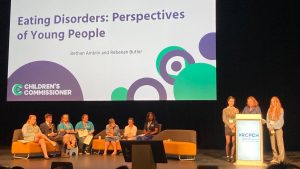
I was delighted to attend a really important conference in Liverpool today, hosted by the Royal College of Paediatrics & Child Health, and to be joined by the Children’s Commissioners from Scotland, Wales and Northern Ireland. The best bit though was to be able to take two young people, Bethan Amblin and Rebekah Butler, with me. They go to Sir Isaac Newton Sixth Form and want to go on to study medicine. If today is anything to go by, they will be attending as doctors soon! They spoke so eloquently and gave an inspiring, thoughtful and forward looking plenary about eating disorders. I was so proud of how well they did, and was inspired by their solutions.
As Children’s Commissioners, it is our role to listen to children and to ensure their voices are heard and amplified across those who make decisions about children’s care, so it was particularly exciting to hear from children themselves from across the UK today about their experiences.
I spoke about my priorities as Children’s Commissioner for England too. One of my top priorities is that all children in England have access to mental health care when they need it and wherever they are. Children have told me that they understand the importance of looking after their mental health and wellbeing and many have spoken of the challenges they experience when accessing support.
Last year, my office completed the largest ever survey of young people, which asked them about their lives today, their future aspirations, and what we can do to create change for young people.
Children told us about how much they care about feeling happy and well. Following the toll this pandemic has taken on young people’s wellbeing, this is a generation newly conscious of the artificial dichotomy between mental and physical health. They also recognised the importance of their mental health for their future success: just over half said having good mental health was one of their main future aspirations.
While it is important to acknowledge that the vast majority of children were happy or fine, 1 in 5 were worried about their mental health, and that was children’s biggest worry overall. Older children, girls and children in more deprived areas were all more likely to be unhappy with their mental health, along with some children with additional needs(such as children with a social worker or young carers).
There is particular concern with the mental health of teenage girls aged 14-17 – being nearly twice as likely than boys to be unhappy with their mental health – making Rebekah and Bethan’s presentation today particularly important.
I hope that we can continue to collaborate as medical and policy professionals beyond this conference to make meaningful change for children, and make sure their voices and views are integral to their care.






